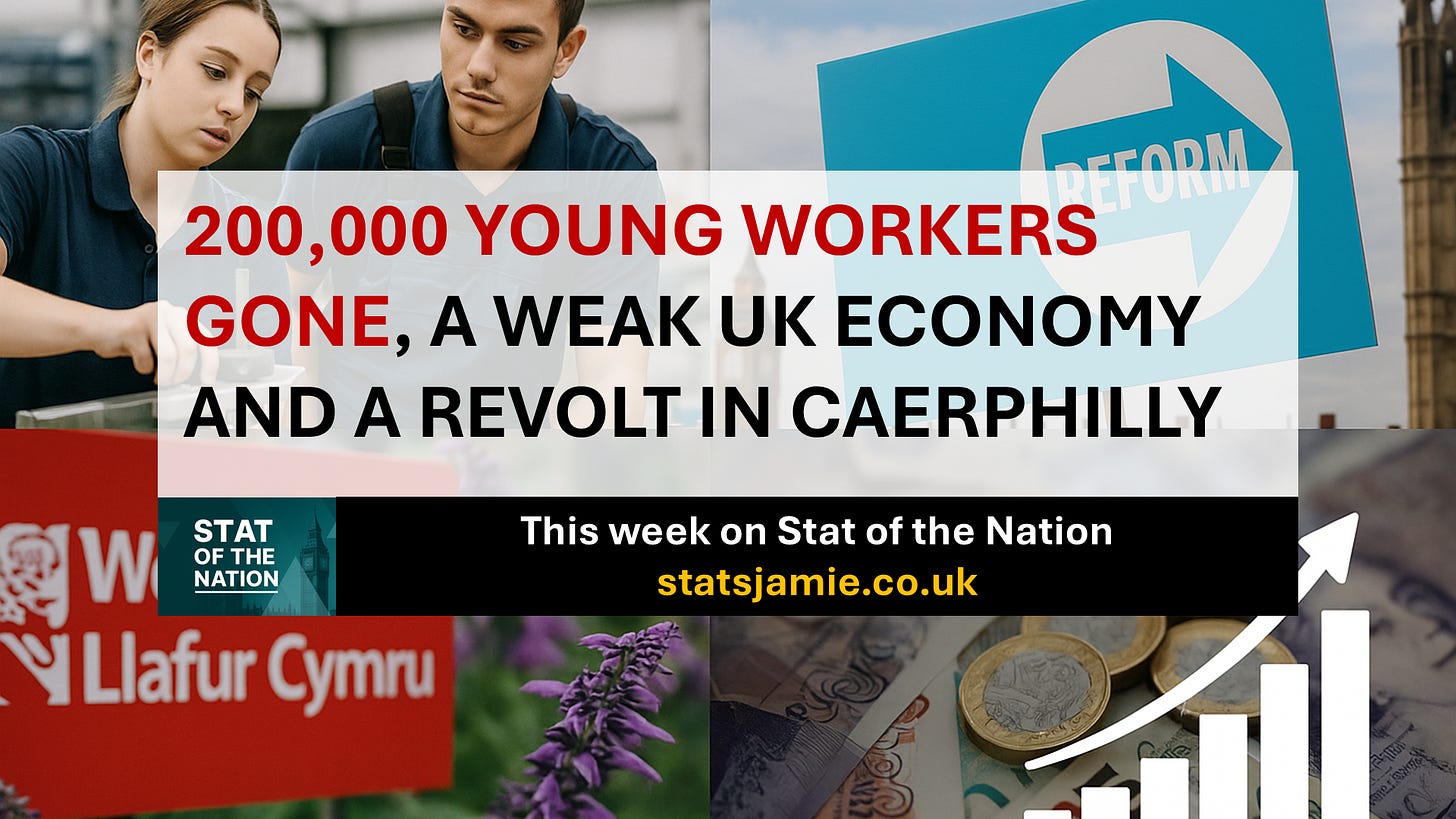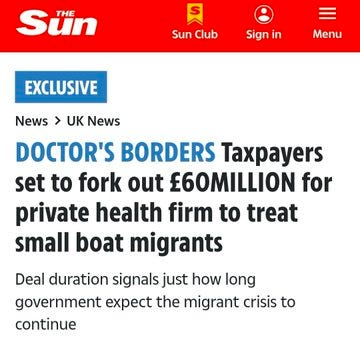This week on Stat of the Nation I covered the disappearance of nearly 200,000 young workers from payrolls, the illusion of growth in the latest ONS GDP data, and the growing political revolt in Caerphilly — where Labour’s old heartlands are turning to Reform.
📉 The Generation Labour Forgot
ONS data show almost 200,000 younger workers have disappeared from company payrolls since Labour took office — the sharpest drop in years.
The sectors losing the most jobs are the ones that usually give young people their first start in work:
Hospitality – 75,800
Retail – 72,700
Manufacturing – 39,700
Meanwhile, the public sector keeps expanding — with pay up 6.7 % compared to 4.8 % in the private economy.
Part of the pressure on youth employment comes from rising wage floors.
The National Living Wage rose from £11.44 to £12.21 an hour in April 2025, while the minimum wage for 18–20-year-olds jumped from £8.60 to £10.00, and for under-18s and apprentices from £6.40 to £7.55.
That’s a 6.7 % rise for those 21 and over — but 16–18 % increases for younger workers.
Coupled with Labour’s jobs tax (higher employer National Insurance), small businesses now face soaring payroll costs at a time of weak demand. The result is predictable: fewer shifts, fewer opportunities, and more young people frozen out of work.
This isn’t “levelling up” — it’s levelling off an entire generation.
👉 Full analysis → The Generation Labour Forgot
🧮 The Growth Mirage Deepens
ONS data show real GDP rose by just 0.1% in August 2025, following a 0.1% fall in July. Over the latest three-month period, growth was only 0.3% — weak by any standard.
The services sector, which makes up around 80% of the UK economy, was flat for a second consecutive month. Construction output fell by 0.3%, and production saw only marginal improvement. The only consistent source of growth came from public spending — rising government wages and employment — rather than private enterprise or productivity gains.
This is what I’ve called Perverse GDP: an economy appearing to grow because the state is expanding while the private sector stagnates.
The IMF’s latest World Economic Outlook adds vital perspective. It forecasts UK GDP per head rising by only 0.4% in 2025 and 0.5% in 2026 — the lowest in the entire G7.
A thriving private sector is the only way to fund a strong public sector. When business stops growing, tax revenues fall, and the public services everyone relies on ultimately suffer.
👉 Read → The Growth Mirage Deepens
🧭 Who’s Extreme Now?
A new MRP poll from Electoral Calculus has turned Westminster upside down — and demolished one of the laziest lines in British politics.
Reform UK, constantly branded “far-right” by pundits and politicians who should know better, now leads the country on 36% of the vote. That’s not a fringe movement. That’s the mainstream.
The same model projects 367 seats for Reform — a clear parliamentary majority — and as many as 445 seats if voters don’t switch tactically to keep other parties out.
By contrast, Labour would fall to around 21% (117 seats), the Conservatives to 15% (24 seats), and the Liberal Democrats to 10% (58 seats).
This isn’t a “protest vote” — it’s a political realignment. Reform’s rise is built on the issues voters consistently put first: the economy, immigration, and the NHS. When millions share those priorities, the “extreme” label simply collapses.
The centre ground hasn’t disappeared — it’s moved. Westminster just hasn’t realised it yet.
🗳 Caerphilly By-Election — The Valleys Decide
This Thursday, voters in Caerphilly go to the ballot box in a by-election that could reshape Welsh politics.
A constituency-level poll by Survation for Camlas Public Affairs shows just how far Labour’s grip has slipped:
Reform UK — 42%
Plaid Cymru — 38%
Labour — 12%
Conservative — 4%
Green — 3%
Liberal Democrats — 1%
Labour has been campaigning under the slogan that “the Valleys built Welsh Labour.” Decades of decline, poverty and broken promises have left the area behind — and Plaid Cymru have spent years propping up Labour in the Senedd, backing the very policies that created this stagnation.
So voters are right to ask: if Plaid have kept Labour in power for years, is a vote for them really a vote for change?
Reform’s surge shows that even in Wales’s traditional heartlands, patience with the old parties is running out. The Valleys once built Labour — this week, they could start building something new.
💷 Taxpayers Hit Again — Bill Could Reach £60 Million
The Sun revealed the government has signed a contract worth up to £60 million with a private health firm to treat small-boat migrants — a deal running until 2035.
That timescale says everything: the Home Office isn’t planning to solve the migrant crisis soon — it’s budgeting to manage it for another decade.
Every month of drift adds cost. Every promise broken adds anger.
🔑 The Bigger Picture
Across every story this week, one pattern keeps repeating:
The private sector is shrinking while the state balloons.
The young and working class are footing the bill.
And voters are turning to anyone who offers change, not excuses.
Britain cannot borrow its way to prosperity or tax its way to growth.
A strong country needs a strong private sector — because only a thriving economy can fund the schools, hospitals and services we all rely on.
If the Valleys built Labour, maybe it’s time the people built something better.
✍️ Jamie Jenkins (Please subscribe)
Stat of the Nation exists to cut through the spin and show the numbers as they are.
If you value clear, fact-driven analysis — please share this roundup with others. And hit subscribe below to get the stats first, every week.
📲 Follow me here for more daily updates:











